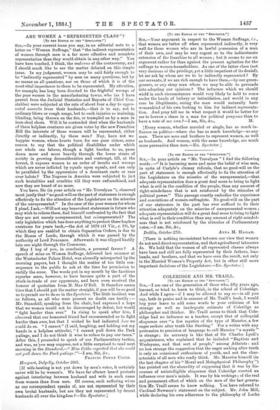ARE WOMEN A "REPRESENTED CLASS " ?
[To THE EDITOR OF THE " SPECTATOR."] SIR,—In your current issue yon say, in an editorial note to a letter on " Woman Suffrage," that "the indirect representation of women through men is a far more effective and complete representation than they would obtain in any other way." You have here touched, I think, the real crux of the controversy, and I should much like to see the matter debated on this simple issue. In my judgment, women may be said fairly enough to be "indirectly represented" by men on many questions, but by no means on all questions, nor on those of which it is of the most vital importance to them to be represented. My attention, for example, has long been directed to the frightful wrongs of the poor women in the manufacturing towns, who (as I have proved from the Judicial Statistics and Reports of Chief Con- stables) were subjected at the rate of about four a day to aggra- vated assaults from their husbands,—that is to say, not to ordinary blows or rough usage, but to such injuries as maiming, blinding, being thrown on the fire, or trampled on by a man in iron-shod shoes. Will it be contended that when the husbands of these helpless creatures are given votes by the new Franchise Bill the interests of these women will be represented, either directly or indirectly, by these men ? Nay, have not we happier women, whose hearts burn for our poor sisters, some reason to say that the political disabilities under which our whole sex labour, though a light burden to us, press down more and more heavily through the lower strata of society in growing deconeideration and contempt, till, at the lowest, it exposes women to an order of insults and wrongs which are never inflicted by equals upon equals, and can only be paralleled by the oppressions of a dominant caste or race -over helots ? The Negroes in America were subjected to just such brutalities and cruelties till they were enfranchised, and now they are heard of no more.
You have, Sir (in your article on "Mr. Trevelyan "), observed most justly that " no good-will on the part of statesmen is enough effectively to fix the attention of the Legislature on the miseries of the unrepresented." In the case of the poor women for whom I plead, I ask,—Will not any benevolent statesman in future who may wish to relieve them, find himself confronted by the fact that they are not merely unrepresented, but misrepresented ? The only legislation which has done anything to protect these hapless creatures for years back, the Act of 1878 (41 Vic., c. 19), by which they are enabled to obtain Separation Orders, is due to the House of Lords, through which it was passed by the authority of Lord Penzance. Afterwards it was slipped hastily late one night through the Commons.
May I beg of you, in conclusion, a personal favour ? A speech of mine on Women Suffrage, delivered last summer at the Westminster Palace Hotel, was absurdly misreported by the morning papers, but I thought the matter of too little con- sequence to the public to ask at the time for permission to rectify the error. The words put in my mouth by the facetious reporter seem, however, to have become quite a part of the stock-in-trade of our opponents, and have even received the honour of quotation from M. Max O'Rell. It therefore seems time that I should put the matter straight, if you will be so good as to permit me to do so in the Spectator. The little incident was as follows, as all who were present no doubt can testify :- Mr. Stausfeld, speaking from the chair, had expressed a hope that we women would not be discouraged by defeat, but would " fight harder than ever." In rising to speak after him, I observed that our honoured friend had recommended us to fight harder than ever, but that I wished he had indicated how we -could do so. "I cannot" (I said, laughing, and holding out my hands in a helpless attitude), " I cannot pull down the Park palings, and I do not think it wise to refuse to pay our taxes." After this, I proceeded to speak of our Parliamentary tactics, and was, as 'you may suppose, not a little surprised to read next morning in the Standard,—" Miss Cobbe regretted that she could not pull down the Park palings !"—I am, Sir, &c.,
PRANCES POWER COBBE.
Hengwrt, Dolgelly, October 28th.
[If wife-beating is not put down by men's votes, it certainly sever will be by women's. We have far oftener heard protests against interfering between husband and wife in such cases from women than from men. Of course, such suffering wives as our correspondent speaks of, are not represented by their own brutal husbands, but are they not represented by decent husbands all over the kingdom F—En. Spectator.]














































 Previous page
Previous page